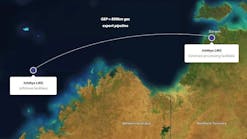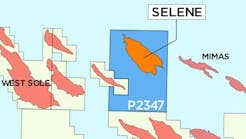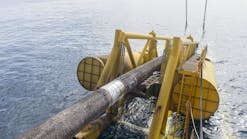The winning bidders form Barzil's Round 1.
On June 16th, representatives from 11 companies walked out of the Rio de Janeiro Sheraton Hotel with a stake in one of the hottest oil and gas plays in the world. The hotel was the site of a historic event - the official opening of the Brazilian oil and gas industry to the outside world.
Earlier, the regulatory body of Brazil's petroleum industry (ANP) officially ended state-owned Petrobras' 45-year-long monopoly of the country's sector with the commencement of the aptly-named Brazil Round 1 licensing round. Twenty-seven licenses were offered in eight of the country's basins. Of the 27 licenses, 12 were awarded, for a grand total of R$321.6 million (approximately $180 million).
Prior to the auction, interest in the licensing round had been much lower than expected. But even with 15 licenses not receiving bids, the ANP raised R$315.8 million over the minimum total signature bonus for the blocks (R$5.8 million. A total of 21 bids were made on the 12 blocks from 14 companies (six countries).
The highest bidder in the round was Agip who bid successfully on four blocks for a total of R$172,661,222. Petrobras, not wanting to be counted out with outside producers making claims in its back yard, offered the most bids of any participant (seven) and received the most licenses (five). Other high bidders were Texaco with six bids (3 successful), Esso with four bids (2 successful), and YPF with four out of four successful bids.
Six of the licenses were granted to groups of companies bidding jointly on the licenses, with the remaining six going 100% to individual companies. The average bid per block was R$26,804,750, well over the R$214 million minimum signature bonus. Each block also had an average time commitment of 25% to exploration and 27% to development.
The most sought-after license area turned out to be the BM-C-4 Block in the Campos Basin. Four bids were placed on the block with Agip (55%) and YPF (45%) taking the final bid at R$51,000,128. The highest signature bonus paid, however, was R$134,162,101 for the Santos Basin BM-S-4 block, also won by Agip.
The onshore, however, gained little interest. No bids were submitted on the four licenses. Of the offshore licenses not bid, one remains in the highly prolific Campos Basin (BM-C-2), and four lie in the Santos Basin, Brazil's second most attractive offshore play. The others lie in the Cumuruzatiba, Camamu/Almada, Potiguar, and Paraná basins.
The contract signatures will be signed on the blocks by the end of next month. The remaining licenses will be put on hold for future licensing rounds. This licensing round comes amidst unsettled price conditions. Oil prices have moved higher, but are not yet stable, and the Brazilian economy is recovering from a near-collapse. However, the strong interest in this licensing round proves two key points: Brazil is hot, and oil companies still have money in their coffers for a rainy day opportunity.
Shell, Lasmo gaining foothold in Iran
Shell and Lasmo are making a significant, but controversial, push into a strong market. Late last year, the two companies signed a $19 million, 18-month exploration study agreement in the Iranian sector of the Caspian Sea. Under this agreement, the companies were to acquire 10,000 km of 2D seismic, which is now being gathered by Fugro. This will be followed by the selection of up to four blocks for negotiation of service contracts. The companies also are conducting a simultaneous six-month study of an additional area with existing seismic, which could lead to the award to an additional two blocks.
The two producers recently selected the blocks they plan on developing, where existing seismic data is available. They submitted the proposed development blocks to the National Iranian Oil Company last month and have until the end of this month to decide on which two blocks to develop. Once this choice has been made, the next step is a 12-month period to negotiate service contracts.
This agreement will be the first time foreign producers will operate in the Iranian sector of the Caspian Sea. However, this comes amid some controversy. Besides the usual United States disapproval of dealings with Iran, because of unilateral sanctions, another country with a much larger stake in the Caspian Sea action has gotten involved - Azerbaijan.
Azerbaijan contends that the sector claimed by Iran in the Caspian is disputed territory and has been since the breakup of the USSR seven years prior. The Azeris feel that contracts should not be signed until the territorial issues are resolved. The Foreign Ministry of Azerbaijan has even sent official letters to the governments of the Caspian nations and all oil companies involved in the region in hopes of gaining their support. Thus far, BP Amoco has complied. The state oil company of Azerbaijan, SOCAR, went on to say that Shell and Lasmo have harmed their futures in Azerbaijan.
This threat of impeding the companies' activities could lead to very serious problems in the future if Azerbaijan has the clout to persuade its neighbors on an all-out regional ban. However, for the short term, the companies seem to be relying on the fact that the proven reserves of Iran far outweigh the probable reserves of the Caspian. Caspian reserves have been spiraling downward as a result of the growing number of dry holes. Taking on risks in this area may seem ominous, but in the short term, the investments provide stability. Who would have thought investing in Iran would be considered stable?




